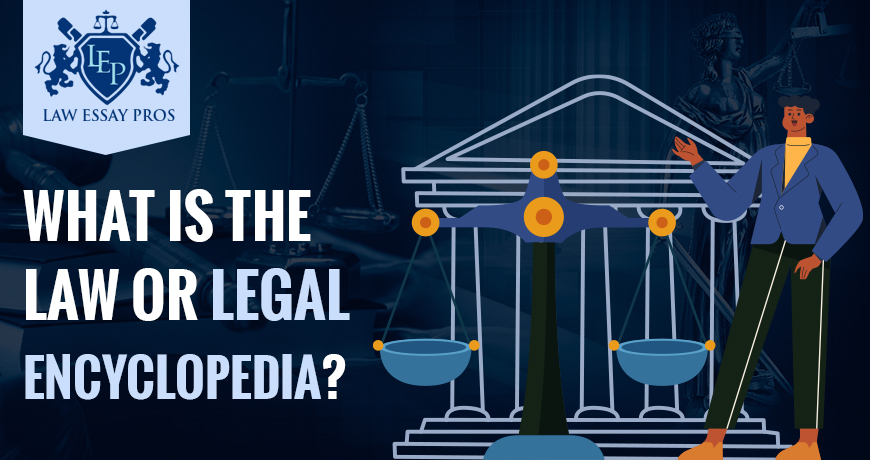
On the Internet, there are many encyclopedias and legal definitions, each one equally different from the other. However, there are some important points that all legal encyclopedias share equally, and these are the ones we will discuss in this guide. Here you will learn exactly what a legal encyclopedia is, how it differs from other online resources, and why it is useful for lawyers, law students, and others who are studying law or studying it as an academic subject.
However, it goes beyond the general definition of words and instead focuses on specific areas of law. For example, if you have questions about environmental law in the UK, you could contact the environmental law encyclopedia to learn more about how national and organizational laws apply to businesses in your area.
Such encyclopedias are generally prepared to deal with complex legal issues and questions because they provide summaries and excerpts of relevant cases and rules that are easily accessible on a searchable web presence. Many types of encyclopedias exist, but most are related to specific areas of interest within the forum.
Various types of legal encyclopedias
The legal encyclopedia contains articles written by legal experts and can be offline or online. Many of these articles provide an overview of specific areas of law, including the main focus on criminal history and legal matters. The encyclopedia provides a comprehensive and systematic summary of any given field—in law, there are many different types to choose from: criminal law encyclopedias, corporate law encyclopedias, and constitutional encyclopedias, to name some
Information about the legal encyclopedia
A legal encyclopedia, also known as a lawyer's encyclopedia or lawyer's desk reference, is a comprehensive resource for legal knowledge and definitions. Today, most encyclopedias are available in both print and online formats. An attorney's encyclopedia can help you quickly find common legal terms and conditions related to your workplace. It may also help you do your job better by keeping you up-to-date on any changes in the law or the laws of the land.
The role of the legal encyclopedia
Legal encyclopedias are used as a reference tool for legal professionals as well. They contain complete entries, written in official terms, for legal-related topics. There are both printed and online legal encyclopedias available for free.
A legal encyclopedia
A legal reference work in which each entry is presented in terms of the concepts, institutions, topics, doctrines, and strategies in law. A legal encyclopedia can be one or both: (1) an alphabetical list of topics with brief explanations; (2) a complete book on legal topics listed alphabetically or by subject. A standard content table is organized according to the study area.
What is the significance of the legal encyclopedia?
The legal encyclopedia provides quick access to information about legal topics, lawsuits, and legal opinions. Also called "law dictionaries" or "legal encyclopedias," these books are intended for lawyers and non-lawyers who want to get an idea of how laws affect various aspects of our lives. A good legal encyclopedia enables students to quickly access information based on specific legal principles and concepts. Many legal encyclopedias contain detailed explanations of laws and court cases that interpret those laws.
Why are legal encyclopedias helpful?
Legal encyclopedias are excellent tools for learning more about the law and how it affects our daily lives. Although legal encyclopedias may differ widely in their details, they usually include articles that discuss common legal issues, updates on recent cases, knowledge of specific laws and practices, and references to other helpful sources.
A type of reference work in which an attempt is made to integrate all areas of law (law), which sometimes includes even areas that may be integrated with local, regional, national, or international legal systems. They often resemble reviews of the law, relying on the works of scholars as second sources for their articles. Unlike most journals, encyclopedias are not reviewed by peers (although many of them include selected sample notes). issued annually, monthly, or quarterly. As a research tool, encyclopedias provide a summary of current trends and events in law, including significant decisions and summaries of historical cases.
It can therefore serve as your source of both knowledge and authority in legal areas.
A legal encyclopedia is an alphabetic work that organizes and explains words, concepts, and titles in legal spaces. As it can serve as your source of information and authority in the legal field, it can be helpful to researchers seeking specific information about specific laws or lawyers who need information about their field of work. A legal encyclopedia should not contain advertisements in it.
Law encyclopedias in history:
Legal encyclopedias have been published since ancient times. The first was probably a digest compiled under Justinian I in 500 AD. The first comprehensive encyclopedia of Roman law, entitled Corpus Juris Civilis, was published by Justinian I (527–55 AD). described as a ten-volume code. The work was supervised by Tribonian, a Justinian court official. The code covers everything known at the time and emphasizes the privacy policy.
Since then, there have been many
The first comprehensive English legal encyclopedia was published in New York City in 1815 by William P. Van Ness and others. It covered almost every legal system known at the time, and it consisted of about 2,000 pages bound together in six volumes. Since then, there have been many other such activities, some involving specific areas of law.